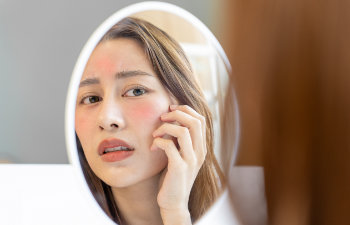
Rosacea is a common skin condition that causes redness and visible blood vessels in the face. It may also produce small, red, pus-filled bumps. While rosacea can affect anyone, it’s most prevalent in middle-aged women with light skin. Although rosacea’s exact cause remains unknown, various factors contribute to its development and flare-ups.
In this article, we’ll delve deeper into what triggers rosacea, its risk factors, and the cutting-edge treatments offered by Spectrum Dermatology of Atlanta’s esteemed dermatologists, Dr. Spitzler and Dr. Murad.
What Causes Rosacea?
While the precise cause of rosacea is not fully understood, experts believe it’s a combination of hereditary and environmental factors. Some potential causes and triggers include:
- Blood vessel abnormalities: Problems with blood vessels in the face may cause redness, flushing, and visible blood vessels.
- Inflammatory response: An exaggerated immune response can result in inflammation, leading to swelling, redness, and other symptoms associated with rosacea.
- Mites: A mite called Demodex is naturally found on the skin. However, individuals with rosacea often have more than usual, causing irritation.
- Bacterial involvement: The presence of a bacteria called H. pylori in the gut can stimulate the production of a protein known to cause blood vessels to dilate, which might play a role in rosacea.
Risk Factors for Rosacea
Certain factors increase the likelihood of developing rosacea or exacerbating its symptoms:
- Complexion: Light-skinned individuals, particularly those who burn easily, are at a higher risk.
- Age: Rosacea is more commonly diagnosed in individuals between 30 and 50.
- Family history: If family members have rosacea, you’re more likely to develop it too.
- Gender: Women are more likely to develop rosacea, but men often experience more severe symptoms.
Treatments for Moderate to Severe Rosacea
At Spectrum Dermatology of Atlanta, we understand the emotional and physical discomfort that rosacea can bring. Dr. Spitzler and Dr. Murad are equipped with advanced treatments to help control and reduce the more severe symptoms.
- Light Therapy: This therapy can help reduce the redness, swelling, and visibility of blood vessels. The treatment is non-invasive and have shown significant results for many patients.
- Topical treatments: These are often used in combination with light to manage rosacea symptoms. They can help reduce redness, inflammation, and the occurrence of acne-like breakouts.
It’s essential to remember that while treatments can control and reduce symptoms, they cannot cure rosacea. However, with the right approach, many patients experience substantial relief and improved skin appearance.
Explore Advanced Rosacea Treatments at Spectrum Dermatology of Atlanta
If you or someone you know struggles with rosacea, there’s hope. Dr. Spitzler and Dr. Murad are committed to offering individualized treatment plans that address the unique needs and concerns of each patient. Discuss light therapy, and other potential treatments by reaching out to us. With the right care, you can enjoy clearer, more comfortable skin. Contact Spectrum Dermatology of Atlanta today, and let’s embark on your journey to healthier skin together.
Posted on behalf of
1725 Windward Concourse, Suite 120
Alpharetta, GA 30005
Phone: (470) 731-8010
FAX: (470) 731-8005
Email: info@specdermatl.com
Opening Hours:
Monday - Friday 8AM - 5PM

